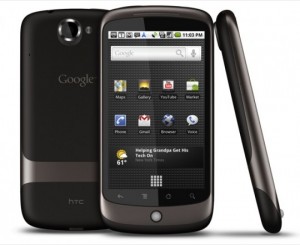So, I was lucky enough to be given a Nexus One by my wonderful employers a few weeks ago, to have a play with and possibly replace my iPhone (3gs) if I liked it. I thought perhaps folk reading this blog would be interested to hear how I’m getting on with it.

Well, the short answer is that I really like it.
Here’s the longer answer:
The Nexus One uses the Android operating system, which is developed by Google, and is a competitor to the iOS of the iPhone and the Blackberry OS, which appears on, yes, Blackberries. Instead of being limited to one company’s hardware, though, Android is open and can be used by any manufacturer.
Here’s a video about the latest version of Android:
This has led to Android being described as a more open system that, say, iOS and this is backed up by the open source nature of Android, based as it is on Linux. The Nexus One is a bit different though, as it is made by HTC, but is to Google’s specification. This has a number of advantages: you get operating system upgrades before anyone else, and the phone is free of any of the crud often automatically installed by carriers and manufacturers. It also means you can stick any sim card you like into it and it should work fine.
Android is therefore often compared with Windows in the 90s, on desktop computers. Apple’s MacOS was only available Apple computers and was tied to the hardware, resulting is a very high user experience but limited sales. Microsoft’s Windows, on the other hand, could be installed on any computer running on an Intel processor, and so was significantly more popular as a result of its portability.
This openness has a number of effects, some good, some not so good. One is that the Android app store doesn’t have the same rigorous checking regime that exists for the iPhone, which means it is easier to get apps listed in the store, but that inevitably brings down the quality somewhat. Indeed, Google are so keen for people to develop for the Android platform that they are making available the Android App Inventor – a drag and drop authoring tool for mobile apps (this reminds me a great deal of the Shoot ‘Em Up Construction Kit on the Commodore 64, but I digress).
Another form of openness is the way the phone integrates with other services. On an iPhone, when you choose to share a photo, you can usually just email it somewhere, or upload it to Apple’s MobileMe service. Choose the share option on the Nexus One, though, and you can email it, or send it to a service like Twitter or Facebook. It also knows if you have installed apps, so on my setup the options to share to Evernote and WordPress are also available. This is in addition to Google’s own services like Picasa and Goggles.
In a similar vein, external service are integrated to your contacts – so I can, if I choose to, add all my Facebook contacts to my phone, where they are added to existing contacts where possible. This is a nice touch, so for instance all my contacts with whom I am also Facebook friends have their Facebook profile picture added to their listing. I can also access people’s Twitter and Facebook pages straight from their contact listing, which is handy.
The camera is a 5 megapixel one, with a flash, and it seems to take excellent photos, as I found on my recent trip to Ireland:

As someone who uses a lot of Google services, not least email, one thing that works as brilliantly as you would imagine it would is the integration with Google stuff. The native email application is a joy to use, and various other Google services have their own apps, or just work extremely well in the browser.
Battery life is pretty good, slightly better than my iPhone 3gs but with things like wifi, 3g and gps turned on all the time.
The downside is mainly the touchscreen, which simply isn’t up to the standard I have come to expect with the iPhone. It’s not as responsive, and typing on it can be tricky. I’ve no doubt I’ll get used to it in time, but for switchers it’s an obvious thing.
So for now I’m sticking with the Nexus One. I’ve had a quick play with an iPhone 4 and didn’t see enough in it to make me want to switch. The Android platform may not be as polished at iOS, but it appeals to my tinkering nature and I’ll forgive some of the user experience let downs for having better control over my phone.


